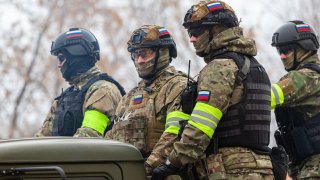Hatred in Wartime
In a society at war, where national survival is at stake, hatred of the enemy may be condoned, or even encouraged, by the state.
While Russia continues its brutal bombardment of Ukrainian cities, including a strike on the children’s cancer hospital in Kyiv, it might seem redundant to ask why Ukrainians hate Russia and how to factor this into efforts to bring about a peaceful resolution to the conflict.
Last month, Olesia Filipenko, a Kyiv-based web editor, started a Twitter feed entitled “I f***ing hated Russia(ns) before it was cool.” She invited people to submit a photo that explains why they hate Russia.
The site quickly attracted a few dozen posts, mostly from people in European countries that the former Soviet Union invaded. The photos show Soviet tanks occupying various European cities (Budapest in 1956, Prague in 1968) or mass graves following Soviet occupation (Finland in 1940, or the Baltic countries in 1940 and 1945).
Someone from Denmark posted a photo of the destruction wrought on the island of Bornholm, liberated by the Soviets from Nazi occupation in 1945 but reduced to rubble in the process. A Swede posted a painting of the battle of Poltava in 1709, a turning point in the Great Northern War between Russia and Sweden. A Chinese contributor posted a photo of clashes on the Ussuri River in 1969 and an Armenian the Soviet occupation of Armenia in 1920. There is also a post from Syria showing the destruction of Aleppo by Russian aircraft.
There is no doubt that the current war has fueled hatred for Russia—and for Russians—among many Ukrainians. Hatred is an emotion that is not usually discussed in polite company. Nowadays, it is not tolerated in civil society, and it is seen as a negative and destructive phenomenon.
But in a society at war, where national survival is at stake, hatred of the enemy may be condoned, or even encouraged, by the state. We saw this in the United States and Britain during the two world wars—though, after victory, it was seen by many as a shameful part of the wartime experience. We are used to seeing hate as a central feature of totalitarian regimes (think of “Hate Week” in George Orwell’s 1984, for example). Still, we are less comfortable dealing with hate when it surfaces in democratic societies.
Hatred is often rooted in fear and is a consequence of past grievances that fuel current and future conflict. No doubt, many Iraqis grew to hate the United States after the 2003 invasion, just as most Palestinians hate Israel because of the occupation.
Russia has long complained that the West is guilty of “Russophobia”—that is, an irrational and groundless fear of Russia. The hatred that Ms. Filipenko is expressing is something different as it is not an irrational fear of an imaginary threat but a heartfelt response to an all-too-real fear of actual physical violence against one’s community.
Marina Pimenova of Tampere University explains that each of Russia’s Scandinavian neighbors has a special word for the “fear of Russia,” distinct from Russophobia. In Swedish, it is rysskräck, a word that first appeared in 1907. In Finnish it is venäjäpelko, or more colloquially ryssäpelko. In Norwegian, there is russerskrekk (“Russian terror”) and russenangst (“Russian fear”).
It is often argued that we should distinguish between the Russian state and the Russian people since one can condemn the former without hating the latter. The same goes for Russian culture. You can hate Putin but still love Pushkin. In response, Ukrainians point out that Putin could not wage this war without his ability to mobilize Russian society. Opinion polls suggest that a majority of Russians are either indifferent to the war or actively support the regime’s assault on Ukraine.
Too many Russians—including some of the liberal opposition in exile—are willing to portray ordinary Russians as victims of the Putin regime, thereby absolving them of responsibility for the actions of their country. Just as in the 1950s, many Austrians and Germans saw themselves as victims of World War Two, absolving them of any blame for the rise of Hitler.
This does not mean that each individual Russian should be held personally accountable for the war. Many Russians are opposed to the war, and some 20,000 protestors were arrested in the first few weeks after its start. Ukrainians themselves are aware that a sizeable proportion of the soldiers defending Ukraine are Russian-speaking or even ethnically Russian citizens of Ukraine.
Where does this leave us? In a sense, Ukrainians have a right to hate Russia because of the attacks that are killing their fellow citizens and wrecking their homes. However, hatred is a corrosive and debilitating emotion. When the war is over, when Ukraine has confirmed its right to exist as a sovereign state, Ukrainians will be able to start shedding the burden of hate.
Peter Rutland is a Professor of Government at Wesleyan University.
Image: Dmitriy Kandinskiy / Shutterstock.com.

